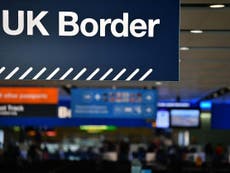Ease restrictions on butchers and bricklayers coming from overseas, ministers advised amid job shortages
Amid fears of staff shortages

Your support helps us to tell the story
From reproductive rights to climate change to Big Tech, The Independent is on the ground when the story is developing. Whether it's investigating the financials of Elon Musk's pro-Trump PAC or producing our latest documentary, 'The A Word', which shines a light on the American women fighting for reproductive rights, we know how important it is to parse out the facts from the messaging.
At such a critical moment in US history, we need reporters on the ground. Your donation allows us to keep sending journalists to speak to both sides of the story.
The Independent is trusted by Americans across the entire political spectrum. And unlike many other quality news outlets, we choose not to lock Americans out of our reporting and analysis with paywalls. We believe quality journalism should be available to everyone, paid for by those who can afford it.
Your support makes all the difference.Butchers, bricklayers and senior care workers should be added to a list of occupations in the UK with a shortage of workers when freedom of movement ends, government advisers have recommended.
The move would allow ministers to ease restrictions on workers coming from overseas to fill the roles.
But the Migration Advisory Committee (MAC), which made the recommendation, warned that most roles in social care were too low paid to qualify.
Just one in ten staff are seen as senior care workers, and receive higher wages as a result.
The social care sector, which has been central to the fight against the coronavirus pandemic will struggle to recruit the staff it needs if wages do not increase “as a matter of urgency,” the MAC warned.
Stressing he was giving his personal view, MAC chair Professor Brian Bell suggested that wages in the sector would have to be raised to at least £10 an hour to begin to attract workers and head off a looming crisis.
With a rash of redundancies expected this winter because of the coronavirus crisis, the MAC also called for the Shortage Occupation List (SOL) to be reviewed every year and not just on an ad hoc basis, as it has been in the past.
Prof Bell, said: “The number of migrants coming to work in the UK has already decreased and we are likely to see an increase in unemployment over the next year as the economic impact of the pandemic continues, so this has been a very challenging time to look at the Shortage Occupation Lists.
“It has made us more willing to recommend some roles for inclusion simply because it is the sensible thing to do, but we have been clear that migration is not always the solution.
“We remain particularly concerned about the social care sector, which is so central to the frontline response to this health pandemic, as it will struggle to recruit the necessary staff if wages do not increase as a matter of urgency.”
The body also said butchers, bricklayers and welders should be added to the list where there is clear evidence of staff and skills shortages which could be filled by overseas workers.
Responding to the MAC report, prime minister Boris Johnson’s official spokesman said: “We have only just received the report and will be looking at the recommendations closely and responding in due course.
“It is worth noting that the MAC itself is clear that immigration is not the solution to addressing staff levels in the social care sector.”
The spokesman said that the government had been providing additional funding to the social care sector and had “set out that we want employers to focus on investing in the domestic workforce”.
Subscribe to Independent Premium to bookmark this article
Want to bookmark your favourite articles and stories to read or reference later? Start your Independent Premium subscription today.



Join our commenting forum
Join thought-provoking conversations, follow other Independent readers and see their replies
Comments